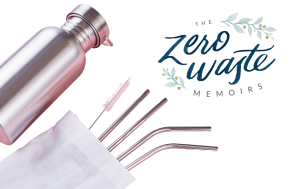Going totally zero waste can seem complicated – trust me, I’ve been there! How do you shrink what goes into that 5 gallon trash can into nothing at all?
In reality, eliminating trash from your everyday life often centers around making intentional zero waste swaps from disposable, limited-use items, to reusable, lasting ones.
Ready to jump on the zero waste train? Start by using up your old products – recycling, giving away, or selling them – then gradually introduce these new, zero waste swaps into your daily life.
If you take good care of them, you’ll be able to prevent all sorts of trash from going to landfill. Woohoo!
This article may contain compensated/affiliate links. See our full disclosure here.
15 Easy Zero Waste Swaps to Make This Fall
1. Safety Razor vs. Disposable Razors
Disposable plastic razors are non-recyclable and expensive. Keep those legs smooth with a durable, stainless steel safety razor instead and stop throwing away wasteful disposables for good!
2. Coconut Oil vs. Traditional Makeup Remover
I have never found a makeup remover more powerful than pure, organic coconut oil. Buy in glass to ensure this swap is as sustainable as possible and use alongside reusable cotton rounds.
Where to Buy: Nutiva Organic Virgin Coconut Oil
3. Bamboo Toothbrush vs. Plastic Toothbrush
Standard plastic toothbrushes are non-recyclable and wasteful. Think about how many toothbrushes you go through in a year! Start purchasing sustainable bamboo toothbrushes instead, and use them with this amazing homemade toothpaste. Once the plastic bristles are removed, they can be composted at the end of their life. Have an electric toothbrush? Don’t throw it away but start buying bamboo or recyclable heads instead!
Where to Buy: WowE Natural Bamboo Toothbrush
4. Bar Soap vs. Liquid Soap in Plastic Packaging
Body wash and antibacterial soap are a wasteful option (unless you buy refillable), especially with so many amazing unwrapped soaps available to us. Check any health food store for unwrapped options – hand soap, body soap, and even shampoo – or choose a product that comes in recyclable or compostable paper.
Where to Buy: Your local health food store or on Amazon
5. Reusable Canvas Tote vs. Disposable Plastic Bags
I absolutely love shopping with my reusable totes and baskets. In fact, my vintage wicker picnic basket is my favorite grocery shopping tool to date! Worried you’ll forget your reusable bag? Keep one in every vehicle, by the front door, and in your purse.
Where to Buy: Port & Company Canvas Bottom Shopping Tote
6. Stainless Steel Straw vs. Plastic Straws
Plastic straws are a great example of pointless, avoidable waste. Straws go straight to landfill, often ending up in oceans and waterways where they damage the environment and harm wildlife. Add a stainless steel straw to your zero waste car kit instead!
Where to Buy: Ultra Long 10.5” Drinking Metal Straws
7. Menstrual Cup vs. Plastic Tampon Applicators
I consider this to be one of the most meaningful zero waste swaps I’ve made so far. The minor investment I made in my reusable menstrual cup means I no longer have to spend a fortune on tampons every month, that I produce no waste in this area, and I don’t have to deal with plastic near my you-know-what. Read about all the options for a zero waste period, here.
Where to Buy: Lunette Menstrual Cup
8. Reusable Water Bottle vs. Bottled Water
Bottled water is such a sham! Because shipping water is cumbersome and expensive, most bottled water is actually just local tap water packed in oil-derived plastic. Not exactly luxury. Skip the throwaway, buy a filter, and use your own reusable water bottle instead.
Where to Buy: Contigo AutoSeal Chill Stainless Steel Water Bottle
Read More: 10 Easy Ways to Live a More Eco-Friendly Life
9. French Press Coffee vs. Disposable Coffee Pods
Throwaway coffee filters and brewing pods really add up, especially if you’re a coffee-every-day sort of person! Look for a brewing option that doesn’t require you use disposables – say, french press or gravity drip – and you’ll be well on your way towards a zero waste coffee routine.
Where to Buy: Bodum Chambord French Press in Copper
10. Stainless Steel Cutlery vs. Plastic Utensils
Always eating on the go? Chances are, you run into a lot of disposable plastic utensils. Next time you’re grabbing a quick lunch, break out a reusable bamboo fork like this one instead. Bonus: it’s a great conversation starter!
Where to Buy: To Go Ware Bamboo Cutlery Set
11. Homemade Laundry Powder vs. Packaged Detergent
My most recent batch of homemade laundry detergent has lasted me over a year. Talk about value! My recipe features ingredients that can be purchased in bulk or in recyclable packaging, so I can rest easy knowing I’m not throwing away a new plastic jug every month. For other ways to have a zero waste laundry, see this post.
Where to Buy: The Simply Co. Laundry Powder Detergent
12. Bamboo Dish Brush vs. Throwaway Sponges
Traditional synthetic sponges quickly become vile, so we throw them away. But did you know there are sustainable, compostable options you can use instead? Check them out!
Where to Buy: Burstenhaus Redecker Pot Brush
13. Glass Containers vs. Plastic Tupperware
I gave up on my plastic containers ages ago. I couldn’t bear the thought of plastic toxins leaching into my foods. Plus, they looked really dingy after a while, and I know when they got too gross they’d go straight to landfill. Swapping to glass was a great decision! They keep my pantry looking pretty, and I’ve found them to be very versatile. Remember to always have one or two on hand in your zero waste to go kit.
Where to Buy: Weck 745 Tulip Jars, 1 Liter, Set of 6
14. Bamboo Utensils vs. Plastic Cooking Utensils
Plastic cooking utensils are low quality, non-recyclable, and can easily melt into your food. Gross! Bamboo utensils are naturally antibacterial, sturdy, and can be composted if necessary. Plus, they’re super elegant!
Where to Buy: Vremi 5-Piece Bamboo Cooking Utensils
15. Washable Cloth Rags vs. Paper Towels
Paper towels are a waste of money and a huge contributor to landfills. Plus, they require gallons of water to make, and are often bleached with chemicals. Opt for reusable rags instead. Just wash and reuse! Ready to start your own paperless kitchen? Here’s how we did it.
Where to Buy: DII 100% Cotton Kitchen Dish Cloths
Do you have any zero waste swaps in mind? Share what you know in the comments!



